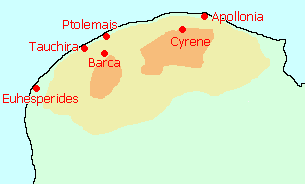Synesius of Cyrene (2)
Synesius of Cyrene (c.370-c.413): Neo-Platonic philosopher, sophist, and bishop of Ptolemais in the Cyrenaica.

In 409, Synesius was invited to become bishop of Ptolemais, a port west of Cyrene and the main center of Christianity in the region. Being a philosopher and a pagan, he was heavily in doubt, but it was an age of war and bishops could do many things for their people. He wrote Letter 105 to his brother, but in fact to the community of Ptolemais (it was some sort of "open letter"), saying that as a philosopher, he could not adhere to certain Christian beliefs, although he was willing to teach them to the illiterate. If his future flock could understand that this was his attitude, and would accept a married bishop who would under no condition dismiss his wife, he was willing to accept the invitation.
His spiritual crisis lasted at least six months,note but in the end he converted to Christianity and was consecrated by Theophilus of Alexandria. This man, who had already blessed Synesius' marriage, was known to be strict in doctrinal matters, and may not have appreciated the way Synesius proposed to combine Neoplatonism and Christianity. Of course, there were more bishops who described Christianity as some sort of Neoplatonism (e.g., Ambrose and Augustine), but they were all ascetic men. Synesius' attachment to his wife was unusual. We do not know whether Synesius convinced Theophilus, or the other way round: Synesius no longer refers to his wife after Letter 105.
He took his religious duties very seriously. His homilies contain no doctrinal errors or unorthodox statements. Instead he offers advice: after Lent, he warns his audience against passing from fasting to food and drunkenness.note His arguments are interesting, because he first mentions a philosophical argument ("it would be against reason"), whereas scriptural evidence is quoted almost as an afterthought - and actually not quite convincingly.
In Letter 147, he admits that he does not appreciate the ascesis of monastic life, but also states that he envies the monks' advance on the road to God. We read about his pastoral sorrows, understand how he deals with an Arian sect, learn how he sought advice from other people, founds a monastery in an abandoned pagan shrine. When he quotes the Bible, he renders the Septuagint very accurately, which proves that he checked the text every time; this is unlike his loose quotations from the Dialogues by Plato, which betray that he thought he knew the texts by heart.
In spite of his pastoral tasks, there was time for literary activities. Among his hymns are Christian compositions. He also wrote a speech In Praise of Anysius (a Roman general who had defeated the Libyan tribesmen in 411), but it soon had to be followed by Letter 73 (asking a general to intervene), and a Catastasis, a lament on the destruction of the Cyrenaica.
During these years, he was involved in the defense of the Cyrenaica,note was sent out as a judge in ecclesiastical affairsnote and had a quarrel with Andronicus, the military leader of the province, who was in the end excommunicated because he had violated the asylum offered by a church.{{Against Andronicus; Letter 58.}} In sum, Synesius was not a happy bishop.
Worse was to come: his three sons died, and contact with his philosophical friend Hypatia of Alexandria was lost.note He must have felt that he was doing the things to which his sense of duty, his philosophy, and the one God had called him, but happy he was not.
He must have died soon after 413, leaving behind a large corpus of texts. Two years later, Hypatia was lynched by a Christian mob.